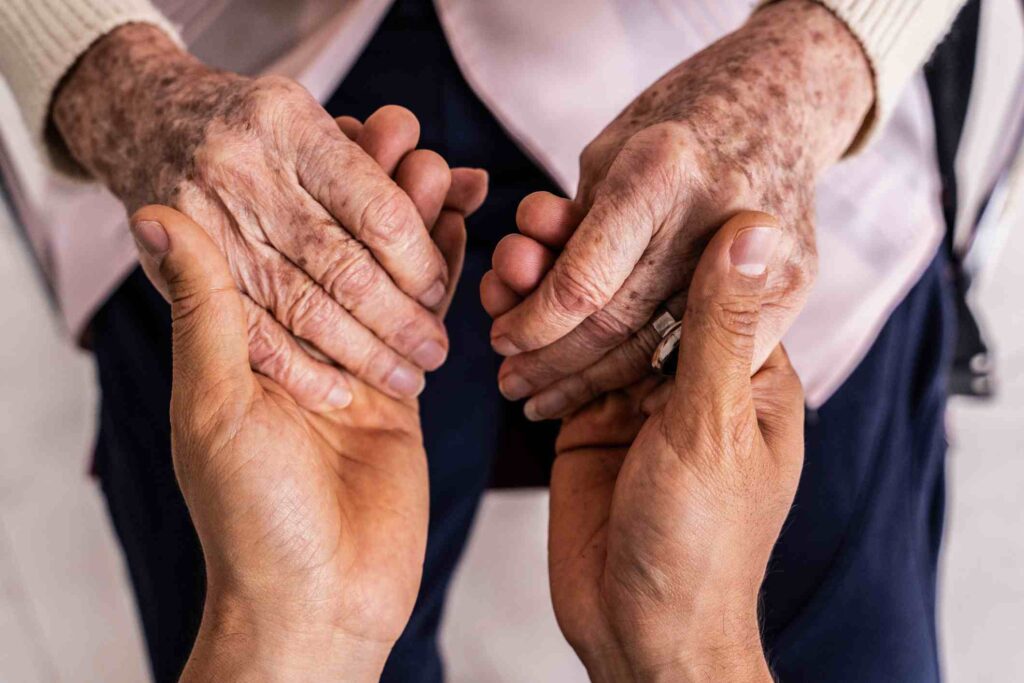Establishing Peace in Difficult Circumstances
How to Find Peace When a Loved One Is in Hospice
When a loved one enters hospice care, families often find themselves navigating uncharted emotional territory. Knowing that curative treatments have ended can feel overwhelming, and oftentimes, families are left with a sense of helplessness and uncertainty. Nevertheless, many people find peace and acceptance over time, even in the hardest of circumstances. Everyone’s journey is different, but these are our tips for acceptance in hospice care.

The Emotional Journey of a Hospice Caregiver
Family caregivers who see their loved ones enter hospice experience a wide range of emotions that can change without warning. Guilt comes up often and tends to surface when taking breaks or feeling moments of relief. Anger may arise toward the situation, and fear about the future is common. Know that these emotional responses are completely normal, and you should never feel ashamed of your emotions. In fact, acknowledging these feelings without judgment creates space for processing and healing. Many caregivers find that naming their emotions and seeking support helps reduce their intensity over time.
How to Accept Things You Cannot Change
Learning to accept unchangeable circumstances requires both practice and patience. Start by identifying what aspects of the situation lie within your control and which ones do not. Write these down if it helps clarify your thoughts. Once you know what you can control, try these tips:
- Focus on the Controllable Things—Put more energy into the things you can control than those you can’t. For example, you can control how you spend time with your loved one, what conversations you have, how comfortable their environment feels, and what kind of support you seek for yourself.
- Practice Mindfulness—Mindfulness techniques like breathing exercises or meditation help you stay present rather than getting lost in regrets about the past or fear about the future.
- Reframe Challenges—When possible, try reframing challenges as opportunities. Sometimes physical limitations lead to deeper emotional and spiritual connections that might not have developed otherwise.
Finding Peace When a Loved One Is in Hospice
Peace is just as important as acceptance in hospice care. Oftentimes, the greatest peace comes from small, intentional actions rather than grand gestures. We recommend creating routines that provide comfort and predictability, even during this unpredictable time. Here are some other ways to promote your own peace:
- Communicate Openly—Many families find that honest conversations about the situation, while difficult, ultimately bring relief and closer bonds. Don’t feel pressured to maintain false optimism if it feels forced or inauthentic.
- Find Sensory Comforts—Do you love listening to music or lighting candles? Small sensory comforts like these can bring feelings of calm, even when you’re feeling stressed and sad.
- Start Meaningful Traditions—You might establish some rituals that feel meaningful to your family. These might include sharing what you’re grateful for, looking through family albums, or reading together.
Creating a Positive Hospice Environment
One of the best ways to gain peace and acceptance is to proactively create a positive hospice environment. Hospice caregivers can work with you to ensure the space feels clean, comfortable, and welcoming. Whenever possible, let in some natural light and fresh air to lift everyone’s spirits. Encourage other family members and friends to visit too, but be sure you’re respecting your loved one’s boundaries and energy levels.
Supporting Children and Teens During Hospice
Children and teenage family members may also feel strong emotions as they see a loved one navigate a terminal illness. If you’re hoping to support the younger folks in your family during this time, consider these tips:
- Avoid Euphemisms—We sometimes change our language when speaking to children. However, euphemisms may only confuse them further. Instead, offer honest explanations using age-appropriate language.
- Encourage Expression—Encourage children to express their feelings through art, writing, play, or conversation. Don’t try to fix their emotions or rush them through the grieving process.
- Keep a Routine—Maintain normal routines for children as much as possible, but stay flexible when their strong emotions require some adjustments.
Providing a Supportive Hospice Environment
Accepting difficult circumstances during hospice care doesn’t happen overnight, nor does it mean you’ll never feel sad, guilty, or angry. However, if you continue to practice mindfulness and acceptance, peace will come with time. The team at Agape Hospice NW is here to support you along the way. We proudly serve families in Portland, OR with comprehensive in-home hospice care. Contact us today.
Frequently Asked Questions
What if my loved one isn’t ready to accept their diagnosis?
Respect your loved one’s timeline for processing their situation. Continue providing love and support while allowing them space to come to terms with their diagnosis at their own pace. Hospice care professionals can help facilitate this as well.
How can I help other family members who are struggling with acceptance?
Do your best to model acceptance through your own actions and words. Nevertheless, you’ll need to be patient, as everyone has their own emotional journey. If you think it will be helpful, you might encourage your family members to seek professional counseling, too.
Is it normal to feel relief sometimes during hospice care?
Yes, feeling relieved is completely normal. Relief might come from seeing reduced suffering, having clarity about the situation, or simply taking breaks from caregiving responsibilities.
What if I’m struggling to find any peace in this situation?
Finding peace during hospice care takes time and often requires support. Consider working with counselors, joining support groups, and exploring spiritual resources. If all else fails, you may just need more time to process this significant life change.


